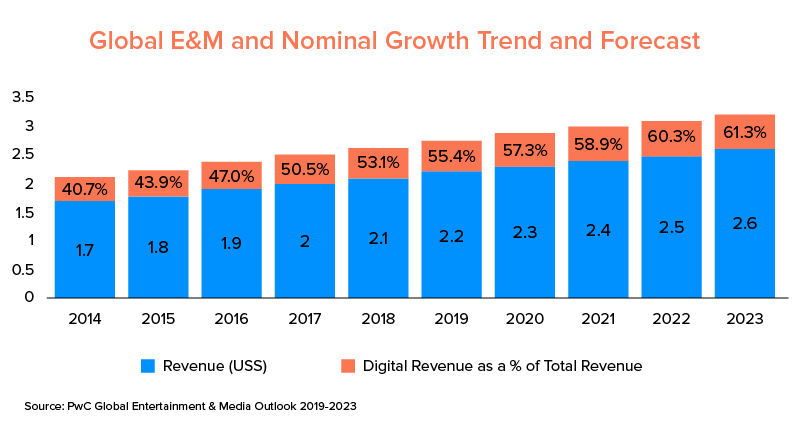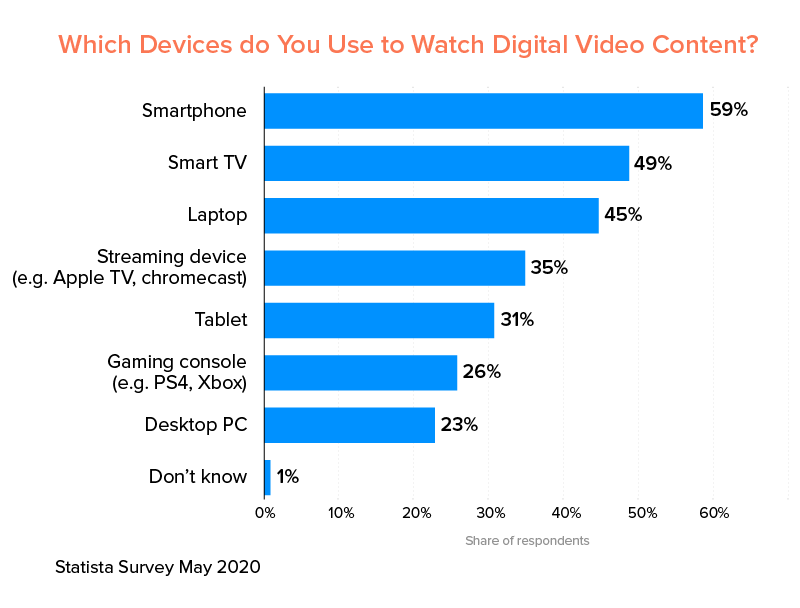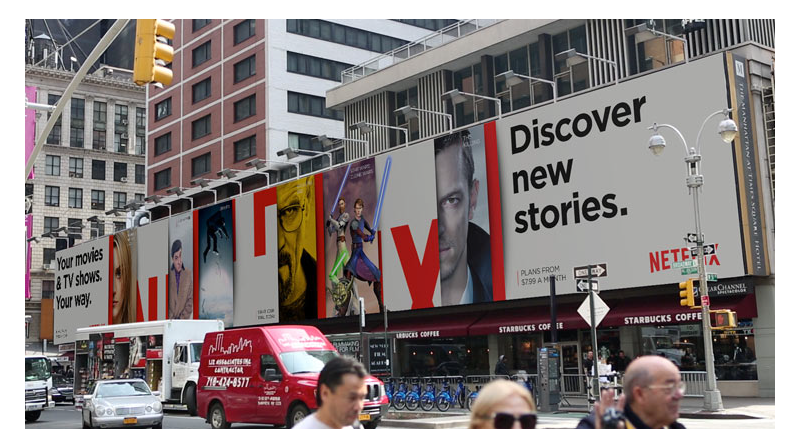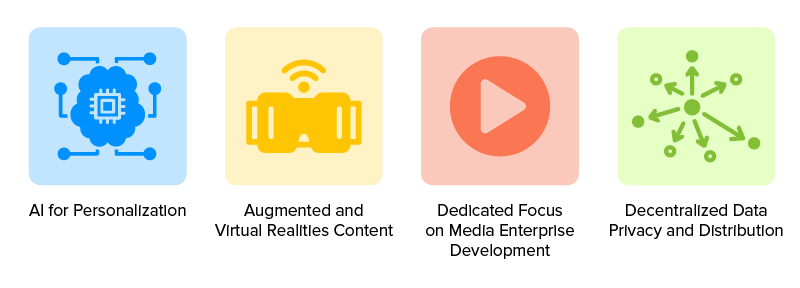- How is the Media and Entertainment Industry Changing
- Business model is constantly evolving
- Advertisement models are emerging
- Customers are now craving new experiences
- Technologies That Can Help Entertainment Brands Get a Leg Up in the Industry
- AI for Personalization
- Augmented and Virtual Realities Content
- Dedicated Focus on Media Enterprise Development
- Decentralized Data Privacy and Distribution
- How to Market Your Entertainment App Towards Success
- Sell Experience
- Reach Out to Your Audience on Multi-Platform
- Promote Ethical Practices and Transparency
- Keep Followers Engaged
The first sign of the digital revolution preparing to reach its climax was when the music industry saw a complete physical to digital consumption shift. What once used to be ruled by records, cassettes, and music CDs came completely on the digital platform with Apple iTunes.
The entertainment mobility event through the face of music app development in itself was a sign that the global media and entertainment industry – across its different genres – is going to witness a massive shift.
Today, the same shift is being seen by the gaming, cable, and news industries – with all of them being consumed digitally and evolving with constant advancements of technology in entertainment.
 In this article we are going to study the shift further while looking into the ways you can charter this change with the help of technology and partnership with an entertainment app development company.
In this article we are going to study the shift further while looking into the ways you can charter this change with the help of technology and partnership with an entertainment app development company.
Technological advancements have brought in a series of new content platforms and providers – Facebook, Twitch, Netflix, and YouTube – which have grown at an exponential state in the last one decade.
[Disclaimer: Netflix is the leading VoD service provider globally. Explore the latest 51+ mind-blowing facts about Netflix for 2022]
With the consumers being presented with so many media and entertainment options, how can businesses win the race of being the best in the marketplace?
– Engaging experience, rich content, proper implementation of technology in entertainment, and heightened personalization.
How is the Media and Entertainment Industry Changing
Business model is constantly evolving
If you go by the digital trends underpinning the media and entertainment domain, you will find that disruptions are constantly sweeping in the M&E industry powering invention and expansion of newer business models. Consumers have started expecting the media and entertainment providers to deliver content according to their convenience, choice, and value – all packed in the personalized experience packaging.
Brands that are considerate about their existence have started giving into this demand on a cross-platform.
(Also read: How Much Does It Cost to Build a live streaming App Like Kick and Rumble)
Advertisement models are emerging
With the lines between digital and linear media blurring, advertisers are evolving to understand and then target the viewers. On the other hand, viewers are getting fragmented across multiple video platforms – live TV to connected TV, and desktops to now mobile and other immersive platforms such as virtual reality, augmented reality, and wearables.

To match this shift in platforms, the advertising medium is also taking multiple forms like native, vertical, 360 degree, and programmatic ads.
Customers are now craving new experiences
There used to be a linear model in operation in the traditional M&E models in terms of distribution, creativity, and monetization. The consumers used to be passive – waiting for the content to be made available to them. But with digital transformation, a new world order has come into existence – it is more disintermediated, atomized, complex, and dynamic. This, in turn, has raised the expectation around how the services have to be delivered.
Till a few years ago, the consumers were delighted to stream content on multiple platforms. Now they want a personalized experience on all fronts – financial services, mobility to entertainment content and communication. Something that has been brought on by the active role of movie streaming apps in redefining entertainment.
The shift, drawn by high competition, that the industry is witnessing on all fronts – consumers, advertisers, and M&E providers – requires a change in how media and entertainment industry providers offer their services.
This change, which can help businesses win the competitive race to the M&E industry top should be on two-ways: technological and marketing. Let us look into both the aspects that make up the most successful mobile apps, individually.
Technologies That Can Help Entertainment Brands Get a Leg Up in the Industry
AI for Personalization
Artificial Intelligence has been playing a huge role in improving customer experience across industries and more evidently so in the entertainment and media industries – making it the key future entertainment technology. This is poised to continue in the years to come as media companies continue working with AI for personal content recommendation and better advertisements.
Considering the growing customer expectations and demand for customized content, media businesses have started making AI an inherent technology. It makes it possible for them to personalize the content that users consume in addition to the ads that the users see. The technology also plays a huge role in understanding customers’ pay preferences.
Augmented and Virtual Realities Content
In 2017, it was anticipated by The Global Entertainment and Media outlook that by 2020, VR content revenue would grow to $5 billion. Even though the application of the technologies in the entertainment industry have been slow, enterprises have slowly started increasing the adoption in the gaming domain.
Dedicated Focus on Media Enterprise Development
In an ode to become big digital media houses, agencies tend to focus more on their exciting media arms and less on the development of intelligent enterprises. This is the reason why a number of entertainment companies, who inspite of having amazing content and a loyal user base have failed.
The time to come will favour those who start making investments in technologies that guarantee high efficiencies, low spending, and greater work processes which are aligned with constant improvements.
Decentralized Data Privacy and Distribution
Over the last few years, fake news and constant misuse of the customers’ data has become the reality of the media and entertainment sector. In 2020 and ahead, media agencies are expected to make use of disruptive technologies like AI and Blockchain for detecting and blocking deep fakes.
Overall, the survival race to becoming the most successful apps in the world will be won by agencies that understand how to use technologies to not just meet their user base needs but also make their business infrastructure smarter.
Now that we have looked into the side of technology in entertainment and which tech can make you a winner in the entertainment race, let us look into the marketing side of it.
How to Market Your Entertainment App Towards Success
Sell Experience
What every media and entertainment entrepreneur must understand is that they compete with the users’ attention with television channels, social media content, YouTube, OTT platforms, and podcasts.
So what they need from your brand in return of their attention would be an immersive experience. One way to achieve this can be through the ‘Live’ content – one that makes consumers feel like they are witnessing everything first hand. Another, more content related way can be what Netflix is doing with its Unsolved Mysteries series. The series asks users to share their ideology or findings on the episodes aired.
The ultimate objective in both of these cases is to offer immersive app experiences – something that is unanimously present in the most successful apps of the domain.
Reach Out to Your Audience on Multi-Platform

Although a no-brainer, you will be amazed how very few media houses reach out to their customers on different platforms.
For an app user, there is a direct access to the trailers of upcoming shows – something that non subscribers remain deprived of. The solution to this gap is simple – promotion. You should promote your upcoming content on social media platforms by using targeted advertisements and postings.
Promote Ethical Practices and Transparency
While the shifting social wave has brought a number of necessities like non-binary movement and black lives matter in the forefront, being media houses, you should go one step ahead from your content choice to be a part of the societal revolutions you believe in.
Focus on promoting a complete transparent and ethical practice for your business – this can include detailing the content fact-checking policy and promoting your brand culture stories that show your brand as a person.
Keep Followers Engaged
Unless you are planning to follow Netflix move of cancelling inactive customers’ subscriptions, we would advise you to keep your followers engaged.
There are multiple ways to retarget your customers – efficient push notification strategy, social media advertisements and emailers telling customers of new season launch, etc. The idea is to use the power of personalization to keep your followers engaged and active on your platform.
Reimagining your entertainment business growth is not easy. You would need to partner with a media software development company to chart the digital transformation route. Your mobile app success will ultimately depend on the efficient build of your application and how well it is able to deliver the same valued experience even in high concurrency events.



How Much Does It Cost to Build a Live Streaming App Like Kick and Rumble?
Have you ever wondered why there's a global surge in the demand for live streaming apps and why businesses are increasingly turning towards them? The key lies in the transformative and immersive way these platforms engage audiences, shattering geographical barriers and forging real-time connections. Live streaming apps like Kick and Rumble have not just changed…

The A-Z of video streaming protocols for businesses
We live in a world where people value information delivery mediums as much as they do insight. Video has become the most palatable source of ingesting information for people, with the average person spending over 100 minutes (or more) consuming video content on a daily basis as of now in 2022. Consequently, video streaming protocols…










